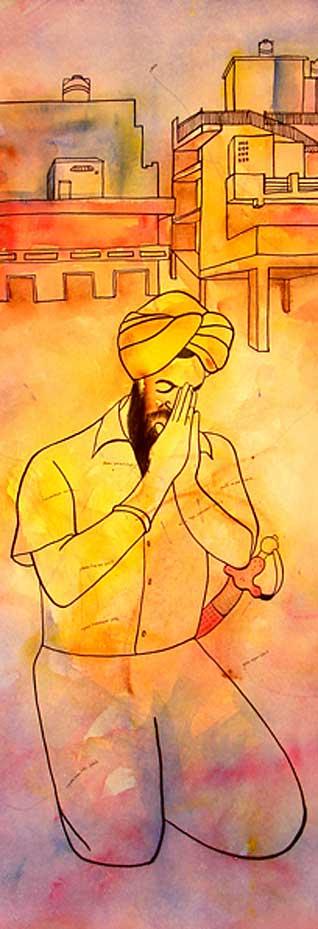Columnists
Is It a Virus?
by JESSI KAUR
I hired a wonderful teacher to give my son lessons in Gurbani Kirtan.
She had recently moved from India, where she worked as a divinity teacher in a Khalsa School. Her ability to communicate in English was marginal and not having an engineering or computer science background, she was a fish out of water in the techno-streams of Silicon Valley.
But she sang beautifully. In a voice that was untrained, but mellifluous. There was a sincerity and sweetness about her that drew people to her kirtan and her persona. Her tunes were straightforward and unpretentious. Everybody could sing along, even tone-deaf people like me.
She would be the perfect person to begin my son's education in kirtan, I thought. So did many of my friends who had young kids in need of a healthy dose of spirituality.
Very soon, Gurmeet became an extremely busy woman. With evenings and weekends crammed with private tuitions, her bheta as a kirtan teacher started to exceed the minimum wages she earned as a sales girl at Mervyn's.
She discarded regular colors for navy blue and donned a more worthy baana, including a dastaar and kirpan at all times. She looked regal and I was full of admiration for her.
My son's lessons in Gurbani kirtan started with much enthusiasm. Gurmeet came every week. Before she began the class, I would offer her tea, and some goodies.
One day, not long after she started coming over, she requested that I cover my head before serving her. From that time onwards, I kept a scarf handy. Every week before opening the door for her, I would quickly put it on.
While having tea at my house, Gurmeet would talk about the struggles she faced in the U.S. Apart from her financial situation, she was also having a hard time finding a suitable husband. Having been in an abusive marriage in India, she was divorced and had come to the U.S. in the hope of a second chance at happiness.
My match-making mind started ticking. I offered to put her profile on SikhNet. She often said that she wished she could teach kirtan as a seva, rather than get paid for it. I would assure her that it was still seva.
One day, she started the conversation by saying that she was saddened by the degradation she was seeing in herself.
"Degradation?" I was puzzled.
"Yes, I was very pure and now look at me: I am having tea made by you!" she blurted out.
At first, totally flabbergasted, a light bulb suddenly flashed in my head. I had heard that in her newfound zeal as a Kirtan teacher, she had joined a group that considered themselves the elite Khalsa. She had, she told me, taken their amrit. ["Their" amrit??! I could hear little alarm bells ringing.]
Sikhs like me were viewed as being amongst the fallen ones. Unlike her, I did not wear a dastaar, or wear a kirpan. I was someone who wore pants and even skirts. Someone that had to be told to cover her head before serving tea!
I burst out laughing. "I am terribly sorry that I have been the cause of your fall," I said. "Would you like to make tea yourself when you come over?"
For a few moments, Gurmeet pondered over this suggested course for her redemption. It seemed that it met her approval. Suddenly, her face lit up. What was she thinking? Was she going to stop coming? I wondered.
"You may pour a cup of milk for me every time I come", she said.
"Milk?" I asked, totally perplexed.
"Yes, milk", she reiterated. "You see, milk is pure. It cannot get polluted."
I was tempted to draw Gurmeet's attention to the scores of people with uncovered heads that had touched the milk before it found its place in my refrigerator. But I bit my tongue. I did suggest that I would put the cup out and she could pour the milk herself. That way, it would flow from the milk bottle to her mouth without my contaminating touch. But she assured me that my touch would not pollute milk or compromise her sanctity. Milk always retains its purity, she explained to me in an earnest tone: "Dudh sucha hunda hai".
What makes this incident perhaps even more interesting is that Gurmeet is a gentle soul who did not mean to insult me. In fact, she was always very respectful. She called me "Didi" and shared her hopes and frustrations with me. She had simply bought into a system that forbade her to eat food cooked and served by anyone other than Amritdhari Sikhs from the same jatha.
I had observed recently that many members of this jatha did not accept karah prasad or eat langar unless it was prepared and distributed by people of their group. Gurmeet's sanctimonious behavior was not in isolation. A holier-than-thou attitude has indeed become a way of life for some Sikhs.
What we are seeing is a sad travesty of Sikh ideology at the hands of well-meaning believers. As Sikhs, we never hesitate to exercise our bragging rights about our egalitarian way of life. The institution of Langar, our last names of "Singh" and "Kaur", the equality of women, are cited as great examples of our belief in equality. But they sound hollow in the wake of the new hierarchies that are being created in our very midst, with matching and isolated life-styles.
Some amritdharies look down not only upon the non-amritdharies, but other amritdharies as well!
The divide between keshadharies and the non-keshadharies, too, is widening at places, as some non-keshadharies carry a big chip on their shoulders and consider the keshadharies orthodox and look upon themselves as the progressive ones.
On the other hand, some keshadharies are reluctant to call non-keshadharies "Sikhs".
The Jats and the Khatris, within some small minds, are in a perpetual state of cold war. The Khukhrains and the Ahluwalias pride themselves on some imagined "higher status". At some places, Jats and Ramgarhias have even committed the obscenity of establishing their "own" gurdwaras.
Lord, we have come a long ways from Ek pita ekas ke hum barak! - "We are all the children of the One Father".
Guru Nanak unequivocally condemned the brahmanical practices, where superstition and false notions of purity created dreadful walls between us.
Our fragmented panth is crying.
I yearn for us to honor the good in every one and let the standards set by our Gurus become our ideals without condemnation of others.
I wish we would stop the regression, the destructive wiping away of five hundred years of spiritual progress that we were handed on a platter.
Take away the simplicity, the straight-forwardness, the openness, the all-encompassing big-heartedness that is our rich legacy, and you'll find that there is not even a smidgen of Sikhi left.
Once we raise the walls that divide us, we'll have to give our faith some other name, I'm afraid. For this is not what being a Sikh is about!
[Images: Top of the page - from a painting by Gagandeep Singh. Cartoon, first from bottom - Courtesy, joe-ks.com. Cartoon, third from bottom - Courtesy, Shannon Jones.]
Conversation about this article
1: Kake (Canada), June 01, 2007, 1:43 AM.
Very good article, in simple yet interesting language. It's always a pleasure to read your work, Jessi! Hope you'll write more often.
2: Parmeshwar Singh (Chandigarh, India), June 01, 2007, 2:30 PM.
Sikhi is so easy. All we have to do is follow the simple path of Guru Nanak and Guru Gobind Singh. Is there anything they have said which is ambiguous or difficult to understand? How did we manage to complicate things so much?
3: Kiran Kaur (Thailand), June 02, 2007, 3:09 AM.
This article was forwarded to me by a friend who felt that it would interest me. It does very much. I personally find that Ahankaar or ego is the most diffucult to get out of. Whenever we do something good or worthy of praise, we automatically have this holier-than-thou attitude. How difficult it is to be truly humble! Waheguru meher kare!
4: Maj. Gen. Inderjit Singh (India), June 02, 2007, 9:08 AM.
Articulate, well written - straight from the heart; obviously by a person having an indepth understanding of Sikhi.
5: Meeta Kaur (Oakland, California), June 02, 2007, 12:40 PM.
Jesse - Nice read! It's amazing how much power and lure hierarchical categories can take on, how much they separate and divide, when it is so much easier to just be. Thanks for sharing!
6: Bhai Harbans Lal (Arlington, Texas, U.S.A.), June 03, 2007, 3:39 AM.
I have always liked Jessie's writings and presentations. We need more writers to speak up like her, I.J. Singh and the others featured in this magazine. It is true that we are getting fragmented, as Jessie laments. Let each one of us look under our own collars and determine whether we too, by any chance, are also contributing to this fragmentation in any way.
7: Bhai Harbans Lal (Arlington, Texas, U.S.A.), June 03, 2007, 3:58 AM.
Let me add to Jessie's true story one of my own. I too recruited a Sikh gentleman to teach Sikh history to my children. He would do so gladly but not eat with us saying that he accepted food cooked only by Amritdhari Sikhs. Until a day came when he told my children the story of Guru Nanak: Nanak rejected food from the arrogant Malik Bhago, but chose to instead partake in a meal with the humble Bhai Lalo. My six year old son blurted out: Was Bhai Lalo an Amritdhari Sikh that Guru Nanak accepted his cooking?
8: Gurpreet Singh Modi (New Delhi, India), June 03, 2007, 9:34 AM.
Many of us are indeed going in the wrong direction. This kind of attitude will result in the formation of sects in Sikhism, the very religion which was formed to curb social inequalities such as these.
9: Roma Rajpal (Santa Clara, U.S.A.), June 04, 2007, 1:00 AM.
Excellent article, Jessi! It is sad and unfortunate that so many people get caught up in the physical aspects of "Sikhi", while ignoring and forgetting altogether its spiritual essence. People live their lives, trying to be good Sikhs according to what they know best. No one has the right to pass judgement regarding who is a better Sikh or who isn't following the Sikh way of life, simply because it is impossible to judge. Our goal should just be to do our best to follow our Guru's teachings with a pure heart.
10: Joginder Singh Ahluwalia (Los Angeles, CA, U.S.A.), June 04, 2007, 2:10 AM.
Very nicely written, Jessie, as usual. You are so right: the jatha and the dera people are doing equal damage to Sikhi, and sadly more than anyone else. This takes me back forty years when we used to travel frequently by train between Punjab, Bihar and West Bengal. During one such journey, I observed the following for the first time: our train was standing at a station and another train pulled in and stopped by the side of our train. I was looking through the window at the other train, while sitting in mine. After a couple of minutes, the other train started moving backwards slowly ... But when I glanced at the platform outside, I suddenly realized that it was merely an illusion. In fact, it was my train that was moving forward; the other one was still. The same scenario later with my train and another train moving side by side, in the same direction. Again, it appeared as if the other train was slowly moving backwards. Only when we had passed the full length of the train, that it became obvious that the illusion was caused by one tain moving faster than the other, albeit both were moving in the same direction. Similarly a Sikh who practices his faith with passion but with a narrow vision can mistakenly believe that his fellow Sikhs are moving in the wrong direction. He will not be free of this illusion unless he looks all around him to get a wider prespective. He needs to stop being judgemental. Or, as a remedy, he needs to get a pair of wide-angle prescription glasses.
11: Kulpreet Singh (Durham, USA), June 04, 2007, 2:48 PM.
When we label others judgmental, aren't we judging them?
12: Roma Rajpal (Santa Clara, U.S.A.), June 04, 2007, 4:10 PM.
This is in response to the judgemental question. When someone makes derogatory comments about others, in this case specifically about how someone is following the Sikh way of life, they are engaging in an act that falls in the cateogory of judging. They are passing judgement, giving their own critical evaluation. No one has asked them for their advice. It is not a question of labeling, it is an observation. The bottom line is that we should not judge others but only judge ourselves on a daily basis through self-reflection.
13: Joginder S. Ahluwalia (Los Angeles, CA, USA), June 04, 2007, 8:07 PM.
Does telling some one not to be judgmental amount to being judgmental? I do not think so. There are things which are Right and then there are things that are Wrong, when measured by the yardstick laid out by our Gurus. Professing that one Amrit is better than another, for example, is simply Wrong.
14: Raman H. Singh (Palo Alto, USA), June 05, 2007, 12:27 PM.
Thank you, Jessi, for addressing an issue that is of great concern to me. I was raised by my Sikh parents in many different continents, to simply desire the highest good of all, in all circumstances. This simple formula works.
15: Chintan Singh (San Jose, U.S.A.), June 14, 2007, 6:08 PM.
An excellent article. Since by far the majority of Sikhs do not delve in such practices, surely we can try and educate those who are drfting away from the basic principles of the faith, can't we?
16: Harmala (Los Angeles, U.S.A.), June 22, 2007, 8:00 PM.
This article is needed it because it draws our attention to our own ignorance, and at least arouses some dialogue. The concept of "purity" is a delusion of grandeur that rests on one of the weaknesses identified in our faith, namely ego. The minute we perceive ourselves to be "better" than our fellow Sikhs, by virtue of our Amritdhari status, for example, or unshorn hair or any thing else, we lose a small piece of our humanity. If more of us remembered the Guru's word, "Waheguru gur mantar hai, jap haumai khoyee", we would be a less divided global community.
17: Jasbir (England), July 22, 2007, 7:55 AM.
My daughter who is 18 was asked whether she was a jat Sikh. My daughter's reply to them was "I am a Sikh, I don't know what a jat or a tarkhaan or anything else is". Poor girl came home and asked me what the difference between a Sikh and a jat is.
18: Inderjeet Singh (Delhi, India), July 24, 2007, 12:27 PM.
FANTASTIC article ... simply the need of the hour! Great work ... thank you and keep going!
19: Tejinder Pal Singh (Canada), September 09, 2007, 1:05 AM.
An excellently written article. We do need to look back into the initiation of our religion and follow the preachings of our revered Guru Sahibs. Trust you will follow up with more of such articles and encourage others to share their experiences, so that they can be a source of awareness for others. Well done.
20: P.S.S.Uppal (India), February 05, 2009, 8:19 AM.
Yes, a good (actually, very good) article. But then, if some feel better thinking so, so be it, but should certainly be without prejudice to the feelings of others. Again, that may be so only in a perfect world.
21: Sukdev Kaur (Muar, Malaysia), April 07, 2009, 4:22 AM.
Very well written. The irony of the matter is that the non-amritdhari Sikh can see the light through the tunnel - that we are all coming from the same source. While the 'elite' Sikh has missed the road and gone off the path. Keep it up, Jessi. Awareness is the key ... and vichaar.
22: Sharanpreet Kaur (Malaysia), May 29, 2009, 8:58 AM.
I heard this story from you when you related it to us when you came over to Sri Dasmesh. I am a 15-yr old secondary student from there and I really enjoyed your session. Very nice article. I enjoyed it.






